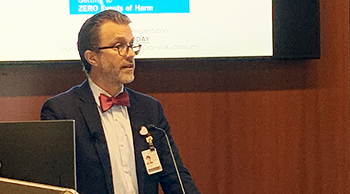
Christian Pettker, MD, associate chief quality officer, helped kick off National Healthcare Quality Week Oct. 20 - 26 with a presentation after Morning Safety Report Oct. 21. During the week, YNHH’s Nursing Professional Governance Quality and Safety Council hosted information tables at each campus to educate employees on quality and safety issues.
Quality Week message: YNHH has much to celebrate, but more work to do
Christian Pettker, MD, associate chief quality officer, kicked off National Healthcare Quality Week Oct. 21 by lauding improvements in key areas and outlining future priorities.
Overall, YNHH has continued to reduce the number of and time between serious safety events (SSEs) since launching high reliability efforts in 2014. In fiscal year 2019, the median days between serious safety events at YNHH was 28 days, up from five days in fiscal year 2013, when YNHH started measuring.
“That’s a remarkable achievement,” Dr. Pettker told those gathered for the Quality Week kickoff, which followed Morning Safety Report.
Improvement efforts have helped reduce readmissions for patients with chronic obstructive pulmonary disease (COPD), C. difficile infection rates, certain surgical site infections (SSIs) and patient mortality. In addition, YNHH made the U.S. News & World Report’s 2019-2020 national Honor Roll of the top hospitals in the nation, ranking nationally in 12 of 16 specialties.
Staff and physicians should be proud of these and other accomplishments, but there is more work to do, Dr. Pettker said. The 2020 performance improvement plan is still being finalized, but priorities include:
- Continuing to reduce hospital-acquired infections, particularly C. difficile, SSIs, central line-associated bloodstream infections and catheter-associated urinary tract infections.
- Working with Bridgeport and Greenwich hospitals to reduce readmissions in patients with pneumonia.
- Improving safety event reporting accuracy, including the consistency of classification for serious safety events, precursor events and near misses.
- Building on successful efforts to control opioid use for inpatients and outpatients.
- Improving HCAHPS patient satisfaction scores, particularly those for communication and quiet at night.
Watch for details on these and other quality initiatives in future communications.